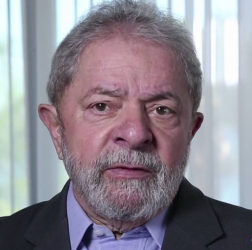CURITIBA, Brazil, (Reuters) – Former Brazilian President Luiz Inacio Lula da Silva made a fiery defence against corruption charges leveled against him during five hours of testimony yesterday in his first appearance before a crusading anti-corruption judge trying the case.
The plain-spoken Lula, who remains a hero to many working-class Brazilians, flatly dismissed the charges and called the case “illegitimate” and a “farce.” He railed against the Brazilian media for having “massacred” his character, saying the media “wants to get me dead or alive.”

Lula is accused of receiving a beach apartment in return for helping the OAS construction firm win government contracts, and of hiding his ownership of it. He strongly denied ever wanting or having ownership of the apartment.
Lula, a former union leader who organized massive strikes in the early 1980s that helped end more than two decades of military dictatorship, made an impassioned final statement.
He accentuated his gruff speech before Judge Sergio Moro, who has spearheaded Brazil’s biggest-ever corruption probe, by pounding his fist and documents on a table and saying prosecutors had failed to produce any concrete evidence against him.
“When I became president in 2003, I made a faithful promise. I was aware that I could never do wrong,” said Lula, who rose from childhood poverty to lead Latin America’s biggest nation for eight years. “If I did wrong, the workers’ class would never again vote for somebody from a lower level.”
Moro, who is not expected to make a ruling on Lula’s case before July, on several occasions interrupted the 71-year-old former president to point out that his closing statement should not stray into political theater or be used to rail against the media.
“The press has no role in this case whatsoever,” the 44-year-old judge told Lula. “The judgment will be made on the basis of law and exclusively according to the proof presented.”
Lula, who is charged in four other corruption cases, is the highest-profile defendant in a sprawling corruption probe known as “Operation Car Wash.” The investigation centers on construction firms that have already admitted to paying billions in kickbacks in return for lucrative contracts at state-run oil company Petrobras.
The former president and his lawyers have repeatedly said that he is innocent of all charges, and aides said after the hearing that Lula was extremely satisfied with his performance.
Lula sits atop recent polls for the 2018 presidential election, but he also scores the highest rejection rate of any candidate.
Lula has said he wants to run for president in 2018, but if convicted could not run.
The investigation has greatly expanded since it began three years ago and now encompasses several state-run companies. More than 90 prominent businessmen and politicians have been convicted, while scores of sitting federal congressmen as well as one-third of President Michel Temer’s cabinet are being probed.
On his way to the hearing, Lula emerged from a car a block away from the courthouse, where he was met by supporters chanting “Lula, warrior for the Brazilian people!”
As he made his way to the building, a stern-faced Lula grabbed a Brazilian flag and began waving it high above his head, but made no comments as he pushed through the crowd.
Thousands of Lula supporters traveled to Curitiba, mostly members of activists groups and unions, arriving in nearly 200 chartered buses from across the country.
They set up makeshift tents along railroad tracks a few kilometers from the federal courthouse and held a nighttime rally in a central plaza as the hearing dragged on.
“Even if they were to prove that everything he has done was wrong, I would still vote for him,” said Gabriel Marshall, an 18-year-old member of the Landless Workers Movement who made a 10-hour bus trip from his cooperative farm in Parana state.
“He was the only one in power who has not robbed from the poor.”
A small group of supporters of the Car Wash investigation gathered in a different area of Curitiba. Last week, Moro released a video on Facebook asking that those backing the inquiry not travel to Curitiba to avoid the chance of clashes with Lula supporters.
During two terms in office, Lula, Brazil’s first working-class president, greatly expanded the social safety net.
Helped by a booming economy and an innovative cash-transfer program, his administration yanked tens of millions of people out of poverty into the middle class. Lula left office in 2010 with an 83 percent approval rating.
Lula was deeply involved in the graft scheme, according to federal prosecutors and former Petrobras executives who negotiated plea deals or are seeking them. Millions in bribes allegedly were funneled into the campaign coffers of his Workers Party as well as nearly every major political party, they say.





